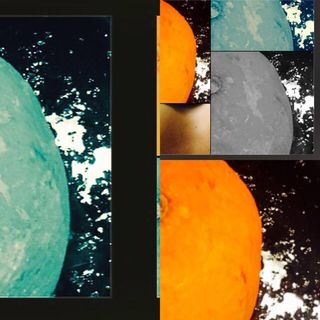
Don't worry, be happy!
Do we really need tragedy in our lives? At first the answer seems ridiculously easy. No, thank you.
Yet it seems to me that only tragedy can successfully nurture our inner ethical compass and our sense of empathetic compassion for others and for ourselves.
While our current society seems to praise positive thinking with rivers of smiling emoticons and heart-shaped candy, I can’t help but agree with Nietzsche when he reproaches his contemporaries for having lost their sense of tragedy.
Sometimes the feeling of powerlessness can be a blessing because it increases our ethical awareness; without this, as Taylor (1992) notes, we run the risk of getting stuck in the trap of deterministic entitlement and proud solitude. Let me explain. If we always have someone else to blame, we can easily end up feeling better than others. At the same time, if we fail to achieve what we want, we may feel entitled, as if life owes us something. More simply put, losing your sense of tragedy may be akin to seeing life as a Calvinistic marketplace where you can buy whatever you want. This attitude has produced modern slogans like “Don’t worry, be happy!” or “Don’t worry, work harder.” Following this mode of thinking, if you end up being homeless or unhappy, it can only be because you haven’t worked hard enough, or (even more bizarre) you haven’t put sufficient effort into thinking positively.
Tragedy and Compassion
It is in this milieu that the books of Unamuno (1921), Steiner (1980), Solomon (2002), and Nussbaum (2013) provide interesting food for thought. Tragedy is what feeds our humility and our sense of limits. Going through a tragic event reminds us that we aren’t truly in control of our destiny and, just like anyone else, we may easily make a fatal mistake (hamartia in Greek) that could change the course of our entire lives. Yet, as Nussbaum writes, we can also learn from the mistake, and this knowledge can enhance the individual social compassion on which a moral society is built.
Even if we would like to think that our accomplishments spring directly from our own merit, when the wheel of fortune starts turning, we soon come to the conclusion that our bad luck doesn’t seem nearly as deserved as our good luck was. Eventually, any halfway-intelligent person must conclude that it is in large part a mere matter of luck, in the Greek sense of something that can happen (tugkano) mysteriously in our destiny (tyche), whether we have a good or a bad life. While it’s true that the disposition we have toward our luck can make a real difference, our lot isn’t something we choose á la carte, and tragedy is there to remind us of this. On the other hand, the sense of mysteriousness that tragedy evokes encourages our eudemonistic judgments—an expression used by Nussbaum, which means that form of thinking that elicits in us a sense of gratitude, care, and compassion.

The Name and Wisdom of Antigone
Antigone’s name bears within itself the fruits of her destiny. In fact, her name is derived from the words anti and genos, meaning “against her own tribe.” Her name is an omen, presaging her own rebelliousness life. As Nussbaum (2013) quite rightly asserts, Antigone is a play about phronesis; it begins with, “Do you know?” and ends with, “Practical wisdom is the most important constituent of human good living.”
According to the play, phronesis (wisdom) seems to be the only way out of certain ethical dilemmas as well as the sorrow that often accompanies our destiny. Consistent with the characters familiar to Homeric society, Antigone’s life is dominated by the principle that “nothing can happen that is not in my lot.” Her ethical life is guided by choices that reflect her inner moral principles (nomos empsychos), which revolve around being faithful to her lot. Her tragedy lies in being herself too much. She is an ethical and religious character because she acts according to her own nature and is committed to following what her personal fate requires her to do. For the Greeks, nature (physis) is the original source of any ethical and religious choice; being able to respect nature and act according to its principles is the key to a wise life.
The Absolutes of Ethics
The play’s primary characters, Creon (Antigone’s uncle), Ismene (Antigone’s sister), and Antigone are trapped in a system of obligations that seems almost written into their natures. Despite the love that they may feel for each other, they are ever controlled by a sense of necessity from which there’s no escape.
All three characters seem to be motivated by good intentions and to abide by the values their society raised them with: euboulia (good judgment), autonomy, and responsibility. Tragically, though, each character is trapped by an absolute belief in only one of these values and in this way isolated in an absolute moral space. In the play, Creon advocates for a civic sentiment of friendship, Ismene for a docile sentiment of philia (familiar love) toward the city and the family to which they belong, Antigone for a pious defense of religious (natural) versus political laws.
The ethical dilemma Antigone faces is whether to bury her brother or abide by the laws established by her uncle, Creon, the new head of state. She finally decides to defy Creon’s decree, despite the almost certain consequences, in order to honor her deceased brother. Creon, compared by Sophocles to the captain of a ship facing a storm, cannot make an exception for his niece or he might come across as a weak leader in a moment of big political turmoil. Ismene, Antigone’s sister, attempts to mediate between the absolute positions of these two characters, the anarchist and the tyrant, but without success.
The tragedy of these characters casts some light on another value, that of being an autos gnotos orga (v. 875), someone who acts according to a “self-invented passion.” The greatest value of this sort of tragedy is the self-known passion that alone can ground a true “autonomia,” the ability to give yourself a system of laws and principles that you are able to perceive as real.
Three Justices at Work

There are at least “three justices” at work in this play, all of them apparently reasonable. Creon’s dike (justice) is fully political. He accuses his niece, Antigone, of having broken his royal decree by performing funeral rites for her brother. Antigone’s sense of justice is religious. She accuses her uncle of having broken religious law by denying her brother Polyneices a funeral. The chorus has its own idea of justice, accusing Antigone of being inclined toward trouble, just like her father.
Which sense of justice should prevail over the others: the political, religious, or familial? More importantly, can we call any principle that breaks the harmony of a family or a city just? Can more than one principle of justice coexist?
It might be that Antigone is in contact with an eternal law and her decision to bury her brother is highly ethical, but at the same time, we hear Creon thunder, “There is no evil greater than that of anarchy!” (v. 672) Anarchy is dangerous because it disrupts political harmony. What is ethical for Antigone is disruptive for Creon; it is the justice of the tyrant versus the justice of the anarchist.
Antigone’s justice consists of following her own passions (autognoteos orga); phronesis (practical reason) is the sole inner compass she uses as a reliable measure for her life. Inevitably, this sense of justice is inimical to the cohesiveness of the state and her own family, but at the same time, it reveals the vulnerability of each character and elicits in us a genuine compassion for their humanity.
Conclusion
We’re drawn, in the end, to a single unavoidable conclusion: that though we would like to avoid tragedy in our lives, when we do face them, having the courage to go through them is what makes us human and puts us in contact with the fragility of our moral principles.




